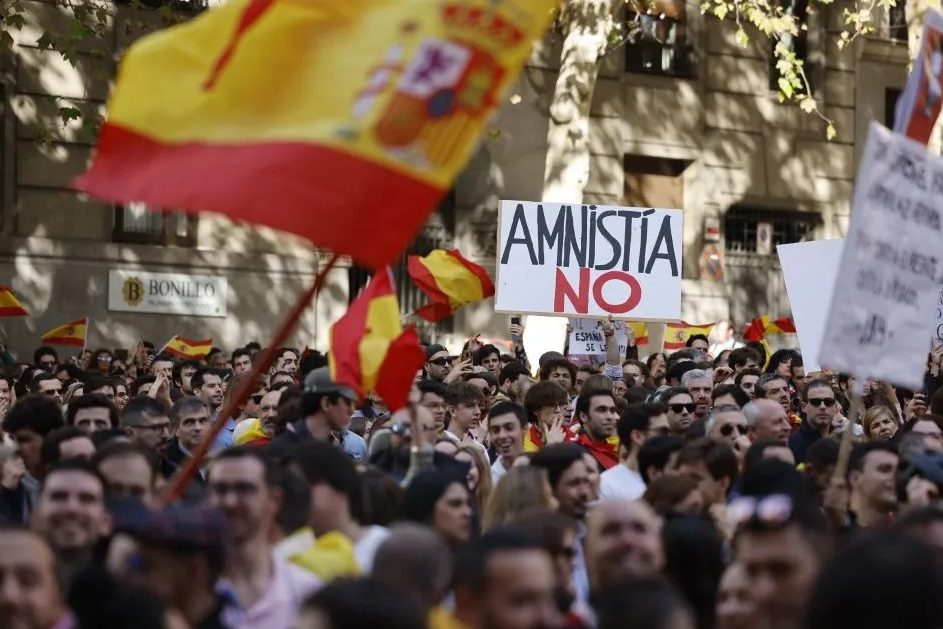This weekend saw protests across Spain after the acting prime minister, socialist Pedro Sánchez, agreed to a general amnesty for Catalan separatists in return for parliamentary votes to enable him to stay in power. The amnesty will benefit hundreds of separatists facing fines or imprisonment for their involvement in the illegal referendum on independence for Catalonia in 2017, the subsequent unilateral declaration of independence and the concomitant street violence.
There have been nine consecutive nights of often violent protest outside the Spanish Socialist Workers’ Party’s headquarters in Madrid. But Sunday’s demonstrations, convened by the conservative opposition, held at noon in over fifty Spanish cities and attended by hundreds of thousands, were peaceful. At the protest I attended in Ávila (population 57,000), a provincial capital in central Spain, some 2,500 people waved flags, applauded the Spanish national anthem, shouted “Viva España” and cheered enthusiastically when the speaker said “History will show we stood up to those who tried to destroy our democracy.” Finally we were encouraged to “go home in peace or to mass or to enjoy a Sunday aperitif.”
Socialist leaders have responded to these protests by accusing the Partido Popular, the main party of the right, and Vox, even further to the right, of not accepting the result of July’s general election. They insist that the amnesty deal and their alliance with the Catalan separatists, other small regional parties and the radical left-wing Sumar, are democratically legitimate and will not only promote peaceful coexistence between Catalonia and the rest of Spain but also usher in four years of stable government.
The problem, however, is that before July’s general election Sánchez categorically ruled out the possibility of any such amnesty, declaring it unconstitutional. He only changed his mind when the election results came in and he discovered he would need the Catalan separatists’ votes in order to be re-elected prime minister.
This abrupt, opportunistic volte face has disgusted Spaniards. A general amnesty implies that the hundreds of Catalan separatists indicted for their involvement in the unlawful events of 2017 had in fact done nothing wrong. As a result many judges say that the amnesty will undermine the justice system and the principle of equality before the law. Clemency for criminals in return for votes is, for millions of law-abiding Spaniards, simply wrong.
To rub salt into their wounds, Carles Puigdemont, the leader of the radical Catalan separatist party Junts, who has spent the last six years in self-imposed exile in Belgium to escape arrest, has been clear that he and other separatists remain ready to take unilateral action to achieve independence. He’s also emphasized that the separatists have nothing to apologize for since they never did anything wrong.
At Sunday’s demonstrations Santiago Abascal, the leader of Vox, described Sánchez’s deal with these separatists as a “coup d’état” which overthrows the rule of law. In a similar vein the Partido Popular’s Isabel Díaz Ayuso, the combative leader of the Madrid region, claimed that Sánchez was “leading Spain towards a dictatorship.” For his part, Alberto Feijóo, the leader of the Partido Popular, vowed that the protests will continue until another general election is held.
Meanwhile Juanma Moreno, also of the Partido Popular and premier of the southern region of Andalusia, described Sánchez as “out of control” and urged socialist MPs to break ranks in the investiture vote which will take place on Wednesday and Thursday. There is little chance however of any such mutiny: Spanish political parties are highly disciplined, top-down organizations filled by “yea men” Sánchez looks certain to get the 176 votes that, in a parliament of 350 seats, he needs to secure another term.
It’s not clear then what exactly the more than two-thirds of Spaniards who, polls suggest, are opposed to this amnesty can do — except look on in horror. Some hope that the European Union will come to the rescue; a placard at the demonstration in Madrid read “EU, help us please,” while here in Ávila there seemed to be almost as many EU as Spanish flags. Encouraging that hope, Didier Reynders, the EU justice commissioner, has expressed “serious concerns” about the amnesty and pressed the Spanish government for more information.
But Sánchez seems unconcerned by the possibility of interference from Brussels. Félix Bolaños, his minister for parliamentary relations, replied that Spain would supply the information —!if appropriate and in due course. Meanwhile Sánchez may be counting on the protests gradually dying down as time passes and people come to accept the amnesty as a fait accompli. The problem with that plan is that it leaves the deep, nationwide disgust at what he’s done to fester.
This article was originally published on The Spectator’s UK website.


























Leave a Reply